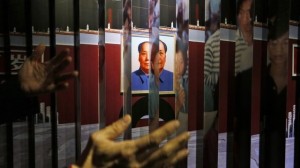JUNE 4, 2011 · 9:50 AM
In memoriam of those who perished on 4 June 1989 on Tiananmen Square. An accidental cross-examination with the Chinese exile author Ma Jian, who dares to remember China’s past in his novel Beijing Coma.
by Julie O’Yang © 2011
The first time when I met Ma Jian, it was two years ago on a wintry day in Brussels. We were both at Europalia, Festival biennal des Arts et de la Culture hosted by the European capital. It sounds better than it is. While a cold wind blew outside the large windows of Royal Museum of Fine Art, the vibes inside reminded me somewhat of Commissaire Maigret coloured haphazardly with a child’s felt pen set. Two days before my publisher had phoned to ask me if I could help a Chinese author named Ma Jian, who was on
the Continent to be interviewed by Dutch/Flemish media. “He needs an interpreter. You get paid for the job,” my publisher had said. Certainly, I had answered. The same afternoon I set out to do my research.
I knew Ma Jian from my high school years in China. His short story collection about Tibet, Stick Out Your Tongue, caused quite a stir at the time. “Stick out your tongue” is what a doctor says when you go to a hospital in China as part of forming a diagnosis. In his stories, the author portrayed a Tibet and Tibetan Culture in a harsh, unpretty but honest way, contrary to the popular, romantic version a la Heinrich Harrer. I don’t remember if I particularly liked the book, but back then I read China’s literary avant-gardists with gusto and devoured every letter that came my way. The fact that language became an enjoyable game, and the outcome excited me and brought me sensational shocks. Six months after the military crash on Tiananmen Square, I went abroad to study. Consequently, I lost track of the literary
scene from my motherland as I myself was left to the hand of fate. I needed to fill some serious gaps, that’s for sure.
Continue reading →



